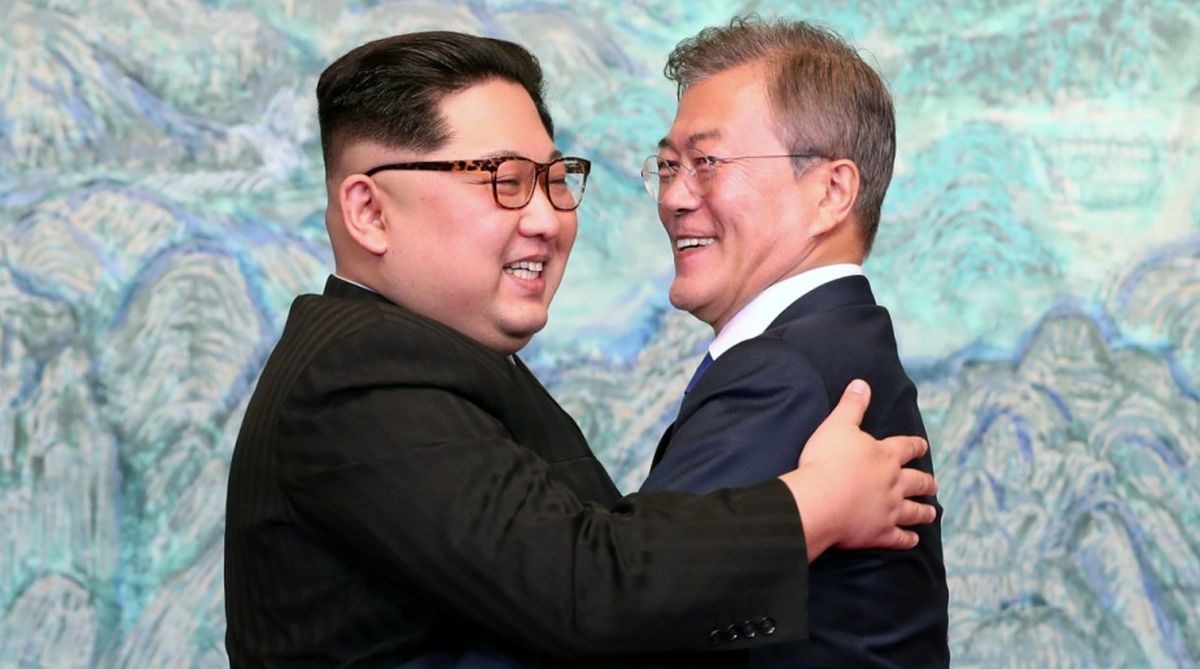South Korea to hold meeting of diplomatic missions next week
South Korea will open an annual meeting of its top envoys abroad next week with a focus on strengthening its diplomacy amid geopolitical challenges, the foreign ministry said on Thursday.
The recent detente between the two Koreas has triggered an intense debate in South Korea on the reunification of the two countries divided since the 1950s.

North Korea's leader Kim Jong Un (L) and South Korea's President Moon Jae-in (R) hug during a signing ceremony near the end of their historic summit at the truce village of Panmunjom on April 27, 2018. The leaders of the two Koreas held a landmark summit on April 27 after a highly symbolic handshake over the Military Demarcation Line that divides their countries, with the North's Kim Jong Un declaring they were at the "threshold of a new history". / AFP PHOTO / Korea Summit Press Pool / Korea Summit Press Pool
The recent detente between the two Koreas has triggered an intense debate in South Korea on the reunification of the two countries divided since the 1950s.
Opinion is sharply divided on the zeal and speed with which President Moon Jae-in has been working on rapprochement with North Korea ‘strongman’ Kim Jong-un that is expected to pave the way for the reunification.
Ask any youngster on the streets of the capital city of Seoul if he is in favour of reunification, there is no clear-cut answer.
Advertisement
“I really don’t know if unification will be good for us. From the emotional point of view, I would certainly like my grandmother to meet her long-lost relatives in the North but in practical terms we, in the South, stand to lose a lot in terms of employment opportunities and other benefits we enjoy as a society,” said Seo-yeon, a university student.
When the same question was put to an elderly looking person, his prompt response was that unification must take place sooner rather than later. His contention was that the unification would help the two Koreas to drastically cut down their defence expenditure and divert funds to social causes like employment, education and health. The unification would make Korea a strong nation that would no longer have to depend on others for protecting its sovereignty and independence, he said alluding to Seoul’s over-dependence on the US in security matters because of the fear of the North.
A photo journalist, who did not wish to be named, said, “North Korea is a resource-rich nation but has no money to exploit its resources…We in the South, with our highly skilled manpower and advanced technology, can indeed exploit this mineral wealth which will be beneficial for a united Korea as a nation.”
There are also those who believe the unification will not be an easy task after all, given the opposition the process might face from the two dominant East Asian powers, China and Japan, which obviously would not like Korea to become strong and stare them in the face.
For many, the idea of unification is far-fetched. Decades of division have created a wide economic and cultural gap that experts say could take years to overcome. To an extent, unification has lost some of its appeal to a generation of young people who have no memory of a united peninsula. Many of them see no benefit accruing to them from the unification of a wealthy and capitalist South with an impoverished and totalitarian North.
Both Koreas repeatedly called for peaceful unification and marched together under a unity flag at the February Winter Olympics in Pyeongchang. And when a group of K-pop stars visited the North recently, they held hands with Northerners and sang, “Our wish is unification.”
Surveys conducted by leading institutes in South Korea say overall public support, especially of the youth, in favour of unification has steadily declined. Only two among ten South Korean students think unification of the two Koreas is necessary, a survey by the National Youth Policy Institute said. Compared with a similar poll held a decade ago, the portion of young students advocating unification fell 11.4 percentage points, according to the institute. The ratio of advocates of unification was higher among men, middle class students and urban dwellers, it noted.
Advertisement